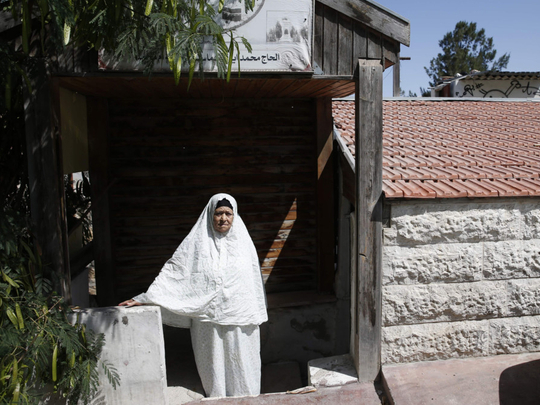
Occupied Jerusalem: Fahamiya Shamasneh, a 75-year-old Palestinian woman, refuses to pack her things despite a looming deadline for evacuating the home she has lived in for more than 50 years.
Israel’s supreme court has ruled the family have until Wednesday to vacate the house in Occupied East Jerusalem.
The family’s supporters have no doubt the house will be handed over to a Jewish family, as part of a wider plan to boost Jewish colonies in the Palestinian neighbourhood of Shaikh Jarrah.
It will be the first eviction in the neighbourhood since 2009, according to Israeli anti-occupation group Peace Now Fahamiya, her sick husband Ayoub, 84, their son and his family have until August 9 to leave the cramped, 50-square-metre (540-sq-foot) basement of their building or be forced out.
“Fifty-three years here means leaving is not easy — it is a lifetime. I was a young girl when I came to this house,” said Fahamiya.
“The police are threatening us. We don’t know what to do,” she said, adding they had not found anywhere else to go.
In 2009, a Jewish family launched a legal process to force the family out, but the claimants later sold their rights to a US-registered company, according to Peace Now.
The NGO says such companies are often used to make it unclear exactly who is behind the push to evict people, a highly-charged political act.
A spokesman for Palestinian president Mahmoud Abbas condemned the planned eviction.
Fahamiya said they had been told to leave peacefully or they would have to pay the cost of the eviction, about 60-70,000 shekels ($16-19,000).
“We will not leave of our own will. Maybe if they force us, carry us and throw us on the streets, then we’ll go. But for us to lock the door and tell them ‘here are the keys,’ that’s impossible,” Fahamiya said.
Peace Now says the house is part of a “larger process the government is undertaking of establishing colonies in Shaikh Jarrah”.
“It is happening slowly, slowly but thank God we are succeeding,” Arye King, director at the Israel Land Fund told AFP.
Fahamiya laughs at the idea of Jewish heirs, saying she lived there for decades without any mention of any legal owners.
Israel occupied Jerusalem during the 1967 War and later annexed it in a move never recognised by the international community.
Since then, Palestinians say that Israel has been conducting a systematic campaign against Palestinians in Occupied Jerusalem including banning Palestinians from burying their dead in specific parts of Bab Al Rahma cemetery, a resting place for many of the city’s historic figures.
Israel has also removed Arabic signage from many streets replacing them instead with Hebrew signs in an attempt to Judaise the city and erase any Palestinian or Muslim identity.
The status of Jerusalem is among the most sensitive issues of the Israeli-Palestinian conflict.
Israel sees all of Jerusalem as its undivided capital, while the Palestinians view East Jerusalem as the capital of their future state.
Jerusalem also hosts Islam’s third holiest site, Al Haram Al Sharif.
Israeli colonies in the West Bank and East Jerusalem are seen as illegal under international law, and are a major stumbling blocks to peace as they are built on land the Palestinians see as part of their future state.
Despite that, Israel continues to build colonies, routinely demolishes Palestinian homes and carries out extrajudicial killings of Palestinians with little or no reproachment from Washington.
The US dedicates nearly one-fifth of its entire US foreign aid budget to Israel, which Palestinians point to as proof that Washington is not an impartial broker.
Israel receives about $3b in direct foreign assistance each year amounting to nearly $10.2m each day.












